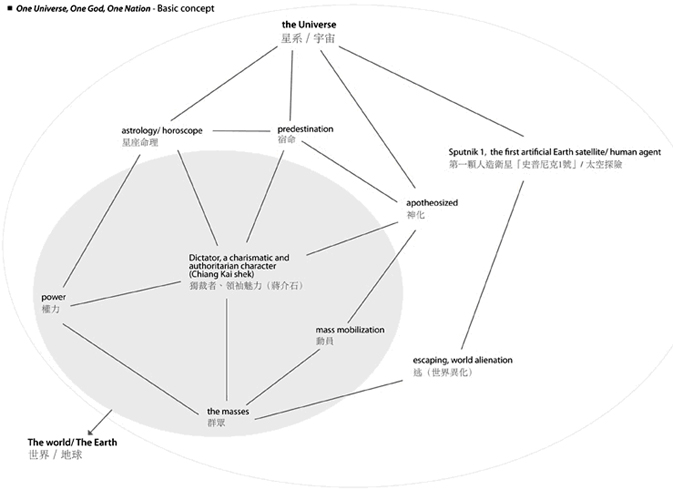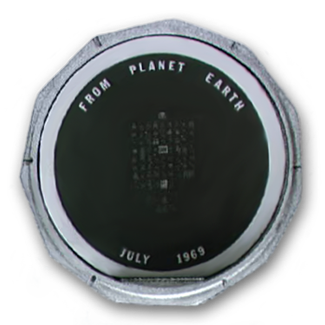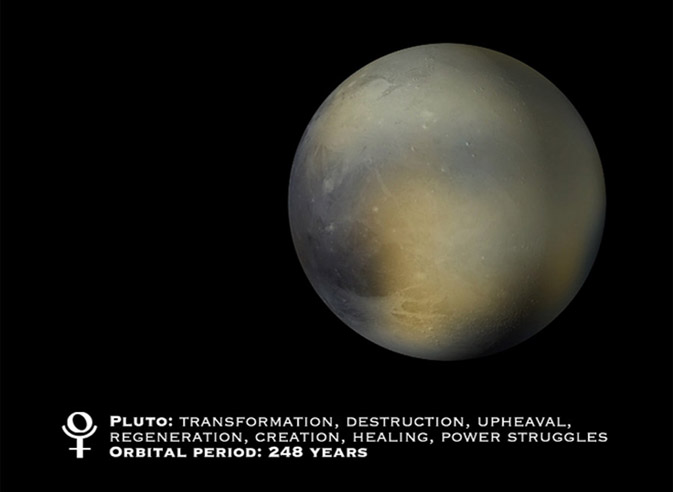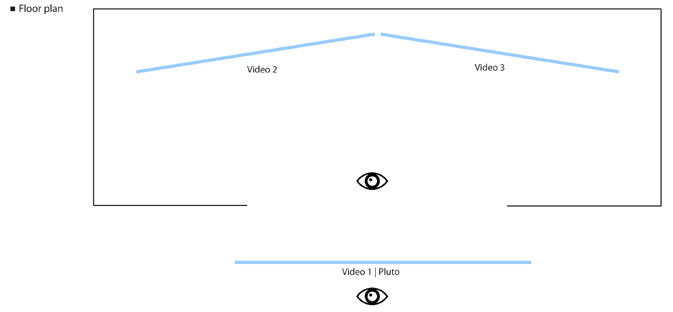ONE UNIVERSE, ONE GOD, ONE NATION:
When fragments of thoughts come together
10 Feb 2013
My 3-channel video installation, ONE UNIVERSE, ONE GOD, ONE NATION (17min., HD, 2012) began as a series of fragments of thoughts. This is a presentation of some of those fragments.

I. Apollo 11 Goodwill Messages
The original title of my project is in Chinese. It was one of the 73 goodwill messages sent to the moon during the first moon landing in 1969. Chiang Kai-Shek (1887–1975, the leader / dictator of the Republic of China) wrote:
This literal translation is way too long for only 8 Chinese characters, so the English title became—One Universe, One God, One Nation.

Apollo 11 goodwill messages—A silicon disc about the size of a 50 cent coin.
(Picture source: Wikipedia)
II. Charisma Is the Power—Dictator or God?
There are very few truly charismatic individuals. These people attract us, bedazzle us, and inspire our emotions. They unite us and lead us toward a single faith, beyond good and evil.
We all share an inclination toward this authority, toward ideologies, toward representations of our fragile humanity. We create them, glorify them, destroy them, and revive them, again and again throughout the centuries, in the hope of reaching Utopia.

ONE UNIVERSE, ONE GOD, ONE NATION | Channel 2 and 3 | 17 minutes loop | HD | 2012
Left: The crowd holding Chiang Kai-Shek’s headshots and cheering “Viva China!” | Right: Chiang Kai-Shek arriving on the main stage

ONE UNIVERSE, ONE GOD, ONE NATION | Channel 2 and 3 | 17 minutes loop | HD | 2012
Left: The crowd cheering Chiang Kai-Shek | Right: Chiang Kai-Shek waving to his people
Chiang Kai-Shek was a key player in modern Chinese history, who participated in and led the Chinese revolution, the Chinese Civil War, and WWII in the Pacific Theater. Eventually he took the entire exiled government (The Republic of China) to Taiwan. He has indelibly shaped the destinies of China and Taiwan throughout the 20th century.
—Chiang Kai-Shek
Whether or not Chiang actually founded a truly democratic nation in “The Republic of China (Taiwan),” he was nevertheless apotheosized by the Taiwanese people. The masses that mourned his death were also worshipping him. Instead of showing too much of footage of Chiang Kai-Shek in the piece, I instead present the phenomenon of mass conformism. In other words, the video work shows Chiang for less than 10 seconds, as it focuses more on the crowd. I focus on how they created their own leader, either during the war or conflict, how they cheered him on, how they grieved, and how they kept their dictator in power, even after his death.
III. Sputnik 1—World Alienation
—The Human Condition, by Hannah Arendt
In 1957, the Soviet Union launched the first human instrument into space—Sputnik 1. In Arendt’s view, this action symbolized a desire to escape from the limited human world into the limitless sphere of the non-human. She called it “world alienation.”
Rejecting being-in-the-world or the natural human environment, this artificial object takes humanity away from the world and into the self. This “flight into the self” becomes a form of “inner exile,”" according to Arendt—an inner world alienation that develops into a motive for the collapse of public culture and the subsequent rise of totalitarianism.

ONE UNIVERSE, ONE GOD, ONE NATION | Channel 2 and 3 | 17 minutes loop | HD | 2012
Left: Sputnik 1 | Right: Chinese Civil War (1927–1950)

ONE UNIVERSE, ONE GOD, ONE NATION | Channel 2 and 3 | 17 minutes loop | HD | 2012
Left: Sputnik 1 | Right: Sputnik 1
IV. Predestination and the Horoscope
World English Dictionary:
Predestination—noun
1. Theology
a. the act of God foreordaining every event from eternity
b. the doctrine or belief, especially associated with Calvin, that the final salvation of some of mankind is foreordained from eternity by God
2. The act of predestining or the state of being predestined
If God exists, everything must happen for a reason, and nothing happens by accident. How does the heavenly sphere, or more scientifically, how do astronomical objects, look at human beings on Earth? How do they relate and connect to events and people on Earth?
Here we encounter Astrology, a different way of looking the reality. Perhaps a “pseudoscience” can explain predestination. In some parts of this video project, I analyze Chiang Kai-Shek through the perspective of his horoscope, and I also apply astrological interpretations to some historical events.

ONE UNIVERSE, ONE GOD, ONE NATION | Channel 2 and 3 | 17 minutes loop | HD | 2012
Left: Sun | Right: Scorpio constellation
Chiang Kai-Shek was born on October 31, 1887, at noon, in Fenghua, Zhejiang Province, China. In other words, Sun in Scorpio and at the Ninth House, moon in Aries, and ascendant in Capricorn. This combination indicates an individual who is headstrong, intense, persistent, and willing to possess leadership. However, this person would obtain his success in a foreign land (Taiwan). (Reference: www.astro.com)

ONE UNIVERSE, ONE GOD, ONE NATION | Channel 1 | 17 minutes loop | HD | 2012
Channel 1 is showing before entering the exhibition room with Channels 2 and 3. It only has one image of Pluto and its astrological interpretation.
Right before WWII reshuffled the world, Pluto was discovered in 1930. It represents destruction, transformation, and healing in the language of astrology. It orbits very slowly, so astrologers claim that Pluto affects generations more than it does individuals—a generation that destroyed much of the Earth and then rebuilt again.
V. The Universe, Historic Recurrence, and Connections
According the resources page of the Buddhist Society, “The Wheel of Life is the context, the way Buddhists see the world and our human condition, the reason we do what we do.” The Buddhist sees life as a cycle, karma, or a chain of causality.
The old saying “history repeats itself” has its own wisdom. Life is a cycle, as does history. It is our destiny, and there is beauty in destiny. The idea of time passing in a straight line is efficient for civilization, but if we listen to a few simple religious and philosophical suggestions, we can imagine time flowing circularly.
Transition.
A sacred power exists in the universe. It shapes our lives. We worship its many diverse forms. Beyond human history, this mysterious authority affects every single element, every occasion, and every cause on Earth.

ONE UNIVERSE, ONE GOD, ONE NATION | Channel 1 | 17 minutes loop | HD | 2012
Left: Sun | Right: Chiang Kai-Shek’s funeral

ONE UNIVERSE, ONE GOD, ONE NATION | Channel 1 | 17 minutes loop | HD | 2012
Left and Right: Space travel, and the beginning of a galaxy

ONE UNIVERSE, ONE GOD, ONE NATION | 5 min excerpt | 3-channel HD video installation | color | sound | 17 min | loop | 2012
◊
Yin-Ju Chen’s primary medium is video, but her works also include photos, installations, and drawings. In the past few years she has focused on the function of “Power” in human society, vis-à-vis nationalism, racism, and group thinking. Her most recent project deals with the radical demarcation of the West and the geographical, ideological, and political borders that define the so-called “Western world.”
yinjuchen.comTaipei Biennial 2012